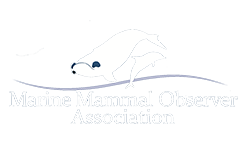Potential Scientific Uses of MMO Data
Offshore activities can occur in areas where little is known about the occurrence of marine mammals and other marine wildlife of conservation concern (e.g., sea turtles, whale and basking sharks, seabirds). This includes some large geographic regions where little scientific research has been carried out (e.g., the eastern tropical Atlantic off the west coast of Africa and large parts of the Indo-Pacific region), but also includes the deep, offshore waters around many continents (since for logistical reasons most marine mammal research worldwide has been focussed on coastal species inhabiting near shore, easily-accessible waters). Consequently, survey vessels and installations can potentially operate as a ‘platform of opportunity’ from which to collect valuable data on the occurrence of marine mammals (and other fauna) for scientific research purposes.
The potential uses of MMO data for scientific research purposes (including specific examples of peer-reviewed scientific papers published by MMOs from their own work on survey vessels and/or installations and having undergone a data permission process with the Client) may include, this is not an exhaustive list:
● Documenting new ranges for species, e.g., common dolphin range extension (FaríasCurtidor et al., 2017).
● Documenting unusual sightings/behaviours, e.g., fur-seals (Lalas and McConnell, 2016), and broad behaviour responses (Harris et al., 2018; Southall et al., 2021)
● Analysing the potential impacts on species, e.g.,species with high site-fidelity (Forney, 2017), and harbour porpoise responses to pile driving (Graham et al., 2019)
● Describing new recommendations, e.g., PAM during pile-driving (Van Parijs et al., 2021)
Suitability of MMO Data for Scientific Analysis
The collection of data that is suitable for scientific analysis is reliant on the use of experienced and dedicated MMOs and PAM operators who are meticulous about the collection of field data and have sufficient expertise with the fauna in question to correctly identify animals in the field. The MMOA strongly recommends that MMOs and PAM operators hired for a mitigation role have appropriate experience where they are familiar with species identification and behaviour and follow rigorous data collection protocols. Please see the MMOA’s Position Statements 4 and 5 – Marine Mammal Observer (MMO) Qualifications and Passive Acoustic Monitoring (PAM) Operator Qualifications - for more information on this subject. For data to be useful in a scientific context, the following are usually required:
- The use of a MMO/ PAM operator who is experienced, dedicated, motivated and understands the importance of accurate data collection and data entry
- The use of a MMO/ PAM operator with proven experience in reliable field identification of the species of interest within the study area
- The routine collection of additional data to support the species identifications recorded in the field, so that independent verification of the data can be performed when necessary. This might include acoustic recordings of the species, or photographs of sightings. It should be noted that many species (for example, dolphins of the Stenella genus, and whales of the genus Mesoplodon) are very similar in external appearance and behaviour, and observers require significant levels of field experience to reliably distinguish between such species in the field.
- Depending on the analyses being carried out, the collection of high-quality supporting effort data. This requires (as a minimum):
- The collection of GPS positions at sufficiently-small intervals (≤1 hr intervals on most surveys; every few minutes where turns between lines are acute, i.e. on site surveys) to reliably recreate the track of a seismic vessel (i.e. through turns) to show the location of survey effort
- Accurate logging of airgun use and related effort data
- Accurate logging of environmental data, especially Beaufort sea state (which is known to be a very important factor influencing the detection rate of marine fauna). It is recommended that where less precise sea state codes are the requirement on mitigation data forms (e.g. the JNCC forms) that precise Beaufort sea state data are collected additionally by the MMO for scientific use (this may also apply to visibility and swell height).
Benefits of Publishing MMO Data
Currently, there are large amounts of potentially useful data being collected by MMOs worldwide that are not being made accessible to researchers and consequently amount to ‘lost data’. The MMOA seeks to encourage publication of appropriate MMO datasets (see above conditions) so that data are available to scientists and, ultimately, feedback into the conservation of marine fauna worldwide.
For the MMO - Using the data collected during seismic surveys is a method of contributing to science and, in the long-term, to the potential conservation of marine species. Scientific publications are also a great addition to a CV, illustrating enthusiasm, dedication, competence and a genuine interest in the topic.
For the Client - Making MMO data accessible for scientific purposes demonstrates Client interest and support for the environment and furthering scientific knowledge, and releasing such data is likely to be of benefit to species conservation. There are no obvious disadvantages to releasing data, assuming protocols are established and followed (see below).
For Protection - Species conservation is reliant on knowledge of when and where a species occurs. This basic information is often lacking, particularly for mobile marine species, and in deep-offshore and poorly-studied regions (where seismic survey vessels may provide a unique opportunity for data collection). The example scientific publications provided above demonstrate how basic data on species occurrence, distribution, taxonomy, behaviour, density and habitat preferences can be provided by MMO data, with obvious conservation implications.
Protocols for Releasing MMO Data
It is important for all parties concerned that protocols relating to the release, and subsequent use, of MMO data are established at an early stage in discussions. The publication of MMO datasets is still relatively rare, and there are no predefined standardised protocols in place to follow. The procedure will be survey-specific, requiring direct discussions between Client and MMO, and in some cases also the personnel agency providing the MMO to the Client. Ultimately, the MMO is contractually bound to the Client, and it is essential that a MMO receives the Client’s express permission before releasing/publishing any data. This may otherwise violate client confidentiality and result in a breach of contract.
Clients should establish from the outset exactly what their data will be used for, which data will be used, what the intended output will be (e.g. conference presentation, scientific paper) and how they will be acknowledged. Clients should be aware that any published data (e.g. a journal paper) will subsequently be in the public domain, and may be referred to in other scientific papers and used elsewhere. Consequently, the Client should have the opportunity to view and comment on both a draft paper (prior to submission to a journal) and the final version of the paper (if accepted for publication). Permission to use the data should include clauses to this effect, so that Client approval is expressly required prior to submission and final publication. This eliminates any risk of information being published that the Client deems to be confidential or otherwise sensitive. A MMO wishing to publish data from seismic surveys should appreciate that environmental datasets are often considered sensitive and should seek to ensure that the process is carried out courteously and as transparently as possible. This will particularly be the case for data concerning potential impacts of airgun activity on marine fauna, and a MMO should clearly state whether or not airgun impacts will be considered within the proposed paper. The MMOA recommends that (as a minimum) a MMO should inform the Client of:
- The aims/objectives of using the data (providing a working title and a synopsis of likely content).
- Exactly which data will be included.
- Where they intend to publish the data.
- How the Client will be acknowledged.
- At which stages the Client will be contacted to approve the paper content.
The MMOA also emphasises that in instances where permission to publish is refused then a MMO should remain courteous, professional and accept that decision.
References
Graham Isla M., Merchant Nathan D., Farcas Adrian, Barton Tim R., Cheney Barbara, Bono Saliza and Thompson Paul M. 2019. Harbour porpoise responses to pile-driving diminish over timeR. Soc. open sci.6190335190335
Harris, CM, Thomas, L, Falcone, EA, et al. Marine mammals and sonar: Dose–response studies, the risk disturbance hypothesis and the role of exposure context. J Appl Ecol. 2018; 55: 396– 404. https://doi.org/10.1111/1365-2664.12955
Farías-Curtidor N, Barragán-Barrera DC, Chávez-Carreño PA, Jiménez-Pinedo C, Palacios DM, Caicedo D, et al. (2017) Range extension for the common dolphin (Delphinus sp.) to the Colombian Caribbean, with taxonomic implications from genetic barcoding and phylogenetic analyses. PLoS ONE 12(2): e0171000. https://doi.org/10.1371/journal.pone.0171000
Forney, K. A., B.L. Southall, E. Slooten, S. Dawson, A.J. Read, R.W. Baird, and R. L. Brownell Jr. 2017. Nowhere to go: noise impact assessments for marine mammal populations with high site fidelity. Endangered Species Research DOI: 10.3354/esr00820
Lalas, C. and McConnell, H. (2016), Effects of seismic surveys on New Zealand fur seals during daylight hours: Do fur seals respond to obstacles rather than airgun noise?. Mar Mam Sci, 32: 643-663. https://doi.org/10.1111/mms.12293
Van Parijs, S., Baker, K., Carduner, J., Daly, J., Davis, G., Esch, C., Guan, S., Scholik-Schlomer, A., Sisson, N. and Staaterman, E., 2021. NOAA and BOEM Minimum Recommendations for Use of Passive Acoustic Listening Systems in Offshore Wind Energy Development Monitoring and Mitigation Programs. Frontiers in Marine Science,8.

